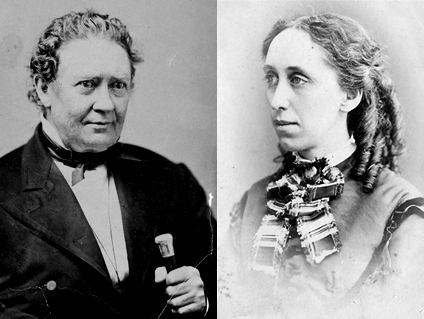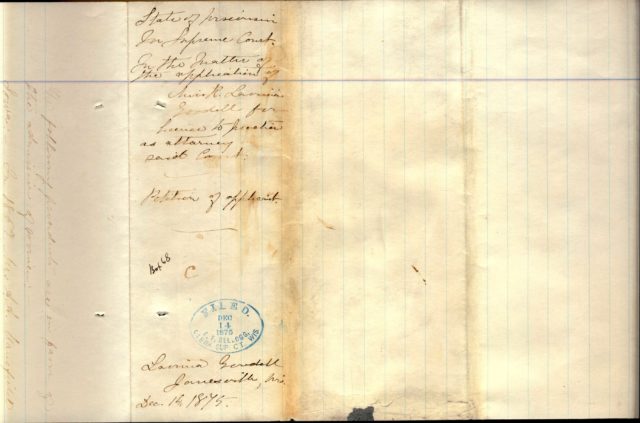The Chief Justice “was mad as a bull when he sees a red rag”
Tyler v. Burrington, where a male jury defied a statute to find for a pretty young plaintiff, is the case that made Lavinia Goodell famous. After that painful loss, she vowed to appeal to the Wisconsin Supreme Court. But first she had to gain admission to that court’s bar. Lavinia’s petition to argue before the Wisconsin Supreme Court led to a showdown with the fiery chauvinist, Chief Justice Edward G. Ryan.

Ryan was a prominent attorney who played a key role in drafting Wisconsin’s first constitution. He sought to root out corruptive influences on the judiciary. And he was involved in a number of the state’s famous early cases—most notably In re Booth, 3 Wis. 1 (1854) in which the Wisconsin Supreme Court declared the Fugitive Slave Act unconstitutional, while Ryan defended the Act and prosecuted Booth for helping a slave escape.
Governor William Taylor appointed Ryan chief justice literally one day before Lavinia was admitted to the Rock County Circuit Court. The press praised his intelligence and integrity but criticized his uncontrollable temper. In 1872, when divorce was extremely rare, his nasty disposition drove his second wife to flee and take their seven children with her.
Maybe Ryan’s frequent public lectures on gender roles played a part in her decision. Ryan believed that a woman’s duty was to make a comfortable life for her husband and bear and raise his children. She should not work outside the home, and she “could not possibly be a good physician, lawyer, priest, professor or officer without being a bad mother.” Nor could women have the right to vote—at least not while the political arena remained dirty and rude. That would corrupt her purity and gentleness. When politics became more civilized, then she could vote.
Lavinia began drafting her petition in November 1875. Did she know she was up against a raging sexist who’d been abandoned by his wife? Her diaries and letters from that month don’t say. After careful research, she based her petition on Wisconsin law, public policy, the interests of justice, and cases from other jurisdictions. For example, the Wisconsin statute governing the admission of lawyers used the masculine pronoun. But Lavinia noted that under the rules of statutory construction, masculine pronouns applied to women too. Furthermore, no Wisconsin statute prohibited women from practicing law. In fact, women were permitted to attend the state’s law school and upon graduation to be admitted to practice.

Lavinia also argued that permitting the other half of the human race to join the bar would promote the administration of justice. Women lawyers could best represent women’s interests. They would also improve the quality of the bar by creating competition with male lawyers. Plus, no one should be barred from earning a living doing work for which they have both a taste and a talent. She listed women who had been admitted to practice in states where the statutes used either masculine pronouns or gender-neutral pronouns. Click here to read Lavinia’s petition, which was reprinted in many papers around the country.
Lavinia worried that if the supreme court denied her petition, she’d lose the ability to practice in the circuit courts. She consulted Judge Conger (who admitted her to the Rock County Circuit Court). He assured her that would not happen. In fact, she told her diary,
He quite laughed at the idea of the old judges refusing me & advised me to go up there and face the music.
That she did on December 14,, 1875. Because she was not yet admitted to the supreme court, she couldn’t speak to the justices. She had to sit quietly in the courtroom while Assistant Attorney General I.C. Sloan read her petition to them. Afterwards she described Ryan’s reaction to her sister:
The Chief Justice is an old fogy and quite opposed to me. He bristled all up when he saw me, like a hen when she sees a hawk, and did not recover his wonted serenity during my stay.
It was fun to see him! I presumed I was the coolest person present. If they don’t admit me I shall try the Legislature with a bill to have me admitted. That’ll keep things stirring. Don’t much care. It will advertise me splendidly! And “the blood of martyrs is the seed of the church,” you know. This will not prevent my practicing in the lower courts.
Lavinia told her diary: “A rich time this morning in the Supr. Ct. . . . Judge Ryan mad as a bull when he sees a red rag kept out all the time. Decision as to my admission reserved.”
Then she waited and waited for a decision. On January 1, 1876 she wrote:
I have nothing yet from the Supreme Court. It seems to take those old fellows a great while to digest my argument. Hope they are having a good time over it. Of course, it is idiotic of them to act so, they hurt themselves worse than they do me. They can’t keep out the rising tide with their mops very long.
Stay tuned to laviniagoodell.com for Chief Justice Ryan’s decision! CB
Sources consulted: Joseph A. Ranney, “Wisconsin’s Legal Giants”, Marquette Lawyer at 36 (Fall 2015); Beverly B. Cook, “Lecturing on Woman’s Place: ‘Mrs. Jellyby’ in Wisconsin 1854-1874,” Signs, Vol 8., No. 2 at 372-73 (1983); Lavinia Goodell’s Diaries, November 27, 1875 through December 15, 1875.; Maria Goodell Frost, Life of Lavinia Goodell (unpublished manuscript at Berea College).








I had not seen Lavinia’s Petition before though I had read the Opinion and her rebuttal. Her methodical, logical presentation of her case attests to her ability as a practitioner. The notion of “judicial discretion”, however, was a thorny one in a misogynistic judiciary and came down in both Bradwell and Goodell to the absence of a state statute requiring it to admit women. Hurray for the Wisconsin legislature taking the 14th Amendment to heart and subsequently applying it to the practice of law.